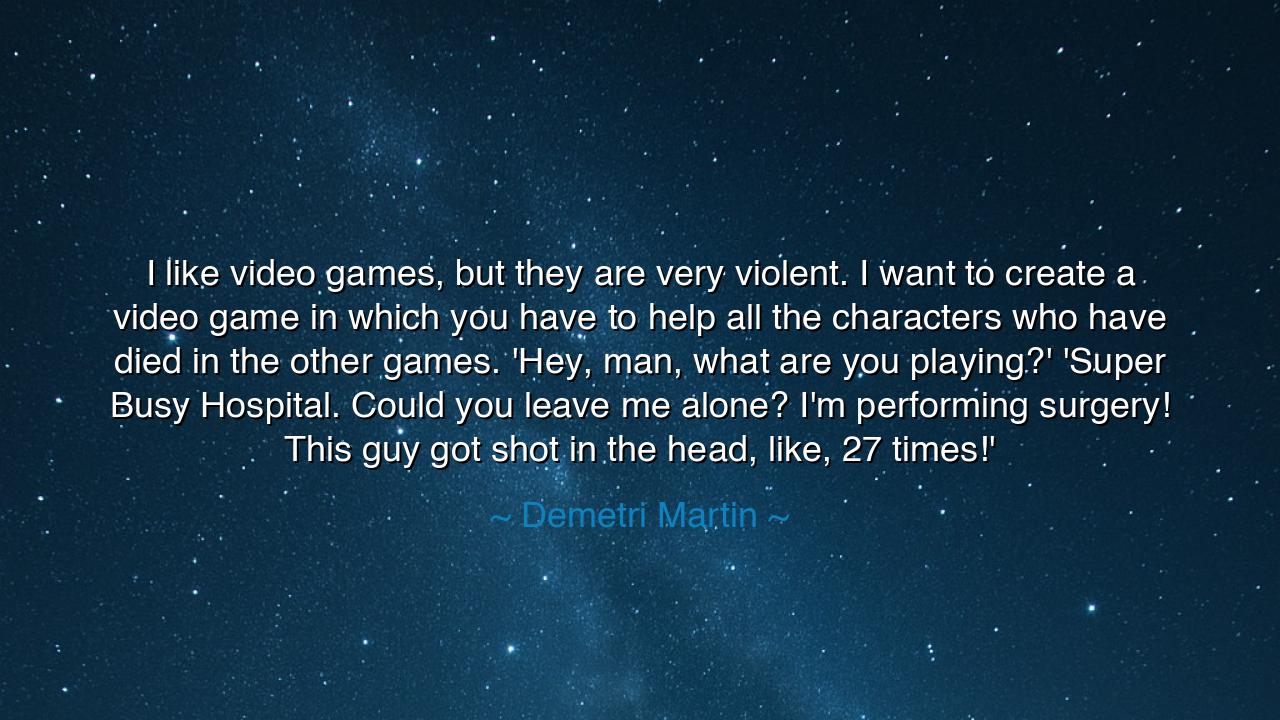
I like video games, but they are very violent. I want to create a
I like video games, but they are very violent. I want to create a video game in which you have to help all the characters who have died in the other games. 'Hey, man, what are you playing?' 'Super Busy Hospital. Could you leave me alone? I'm performing surgery! This guy got shot in the head, like, 27 times!'






“I like video games, but they are very violent. I want to create a video game in which you have to help all the characters who have died in the other games. ‘Hey, man, what are you playing?’ ‘Super Busy Hospital. Could you leave me alone? I’m performing surgery! This guy got shot in the head, like, 27 times!’” — Demetri Martin
In this witty and imaginative reflection, Demetri Martin, the modern philosopher disguised as a comedian, offers more than a jest — he offers a mirror to the culture of our age. His humor, though light in tone, unveils a deep truth: that while our entertainments glorify conflict, we rarely pause to heal the wounds they create. The quote begins with laughter but ends with revelation — that compassion, not conquest, might be the truer test of skill and humanity. Martin envisions a world where the heroes are healers, where instead of fighting to destroy, we labor to restore. Behind his humor, there breathes the ancient wisdom that creation, not destruction, is the highest art of mankind.
The origin of this quote lies in Martin’s own comedic philosophy. Known for his clever wordplay and gentle absurdity, he often uses humor to challenge assumptions. In a culture obsessed with progress, power, and performance, he invites us to look at the consequences of our creations. The world of video games — filled with explosions, battles, and endless respawns — becomes a symbol of modern life: fast, competitive, and often indifferent to the cost of its own excitement. Martin’s imaginary game, Super Busy Hospital, reverses the logic. It transforms the player from destroyer into healer, from warrior into caretaker. What begins as satire becomes something almost sacred: a reminder that even in play, we reveal what we value most.
In this sense, Martin’s vision recalls the ancient healers — those who understood that to mend what is broken is the noblest calling of all. The Greeks honored Asclepius, the god of medicine, whose hands brought comfort to the suffering. The Chinese sages of old taught that the highest power is not the sword, but the art of restoring harmony. Martin’s imagined surgeon, frantically saving the pixelated victims of digital war, becomes a modern incarnation of those forgotten ideals. His humor cloaks a truth the ancients knew well: that mercy is greater than might, and that those who save life serve a purpose higher than those who take it.
There is a profound irony in the image he paints — the player, sweating and focused, trying desperately to undo the harm caused in countless games before. It is absurd, yes, but also deeply symbolic. How often in our real world do we find ourselves repairing the damage left by our own creations — rebuilding after wars, healing after exploitation, reconciling after cruelty? Martin’s joke becomes prophecy. His “Super Busy Hospital” is not just a game; it is the metaphor of civilization itself, forever stitching together the wounds it has inflicted. And perhaps, he hints, it is time we change the game entirely — to live in ways that prevent the harm before it begins.
Consider the story of Florence Nightingale, the “Lady with the Lamp,” who walked through battlefields not with weapons but with healing hands. She entered the same theaters of suffering where others brought death, and from that darkness she drew light. Her courage, like Martin’s humor, carried a message the world too easily forgets: that true greatness lies not in conquest but in compassion. What she did for soldiers in flesh, Martin imagines for the souls of fiction — an act of mercy even toward the imaginary fallen. Both gestures spring from the same eternal source: the heart’s longing to make whole what has been broken.
Yet beneath this compassion lies another wisdom — that even laughter can teach. Martin, like the philosophers of old, uses humor as a bridge between truth and humility. He does not preach or condemn; he makes us laugh, and in that laughter, we awaken. His imaginary hospital becomes a place of reflection: if our games and stories glorify violence, what does that say about us? And if we can imagine a game of healing, perhaps we can imagine a world of peace. The imagination, once turned toward mercy, has power to reshape reality.
So, O listener, take this teaching to heart: learn to laugh, but also to see. When you next pick up a game, a story, or a weapon of words, remember the deeper lesson of Demetri Martin’s wisdom — that every act of creation bears a choice: to harm or to heal. Choose, then, to be the healer. In your home, in your work, in your world, strive to be the one who restores what others have undone. For in the end, it will not be the warriors who save humanity, but the healers, the teachers, the menders, and the dreamers — those who, even in jest, remind us that the highest victory is not in destroying, but in making whole again.






AAdministratorAdministrator
Welcome, honored guests. Please leave a comment, we will respond soon